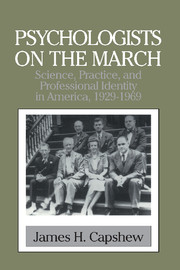Book contents
- Frontmatter
- Contents
- Acknowledgments
- List of Abbreviations
- Introduction: The Psychologists' War
- Interlude I
- 1 Growing Pains: After the Great War
- 2 Mobilizing for World War II: From National Defense to Professional Unity
- 3 Home Fires: Female Psychologists and the Politics of Gender
- Interlude II
- 4 Sorting Soldiers: Psychology as Personnel Management
- 5 Applied Human Relations: The Utility of Social Psychology
- 6 From the Margins: Making the Clinical Connection
- 7 Engineering Behavior: Applied Experimental Psychology
- Interlude III
- 8 A New Order: Postwar Support for Psychology
- 9 Remodeling the Academic Home
- Interlude IV
- 10 The Mirror of Practice: Toward a Reflexive Science
- 11 Beyond the Laboratory: Giving Psychology Away
- Interlude V
- Epilogue: Science in Search of Self
- Index
3 - Home Fires: Female Psychologists and the Politics of Gender
Published online by Cambridge University Press: 06 July 2010
- Frontmatter
- Contents
- Acknowledgments
- List of Abbreviations
- Introduction: The Psychologists' War
- Interlude I
- 1 Growing Pains: After the Great War
- 2 Mobilizing for World War II: From National Defense to Professional Unity
- 3 Home Fires: Female Psychologists and the Politics of Gender
- Interlude II
- 4 Sorting Soldiers: Psychology as Personnel Management
- 5 Applied Human Relations: The Utility of Social Psychology
- 6 From the Margins: Making the Clinical Connection
- 7 Engineering Behavior: Applied Experimental Psychology
- Interlude III
- 8 A New Order: Postwar Support for Psychology
- 9 Remodeling the Academic Home
- Interlude IV
- 10 The Mirror of Practice: Toward a Reflexive Science
- 11 Beyond the Laboratory: Giving Psychology Away
- Interlude V
- Epilogue: Science in Search of Self
- Index
Summary
As the American psychology community mobilized for national defense after the Nazi invasion of Poland in 1939, the possible contributions of female psychologists were overlooked or ignored. The exclusion of women became glaringly obvious at the joint annual meeting of the American Psychological Association (APA) and the American Association for Applied Psychology (AAAP) in September 1940, where reports on preparations for war dominated the discussions. Gladys Schwesinger, chair of the AAAP's Section of Consulting Psychology, disgustedly noted that, “as the list of activities and persons rolled on, not a woman's name was mentioned, nor was any project reported in which women were to be given a part.” Even worse, there was no promise that things would change. Some of the women protested, but with little effect. Summarily ignoring their professional status, the male leaders informed them that tradition favored the services of men in wartime. Women were supposed to “keep the home fires burning.” At best, they could expect to “wait, weep, and comfort one another.”
Unwilling to take no for an answer, about thirty of the women met to lobby for a role in mobilization efforts. They promptly confronted Robert Brotemarkle, the AAAP representative to the Emergency Committee, with two pressing questions. Would women be omitted from the National Register of Scientific and Specialized Personnel that was being collated? And would they gain representation on the all-male Emergency Committee itself?
- Type
- Chapter
- Information
- Psychologists on the MarchScience, Practice, and Professional Identity in America, 1929–1969, pp. 71 - 90Publisher: Cambridge University PressPrint publication year: 1999



